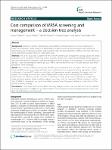Cost comparison of MRSA screening and management – a decision tree analysis
Tübbicke, Andrea
Hübner, Claudia
Hübner, Nils-Olaf
Wegner, Christian
Kramer, Axel
Fleßa, Steffen
Background: Methicillin-resistant Staphylococcus aureus (MRSA) infections represent a serious challenge for health-care institutions. Rapid and precise identification of MRSA carriers can help to reduce both nosocomial transmissions and unnecessary isolations and associated costs. The practical details of MRSA screenings (who, how, when and where to screen) remain a controversial issue. Methods: Aim of this study was to determine which MRSA screening and management strategy causes the lowest expected cost for a hospital. For this cost analysis a decision analytic cost model was developed, primary based on data from peer-reviewed literature. Single and multiplex sensitivity analyses of the parameters “costs per MRSA case per day”, “costs for pre-emptive isolation per day”, “MRSA rate of transmission not in isolation per day” and “MRSA prevalence” were conducted. Results: The omission of MRSA screening was identified as the alternative with the highest risk for the hospital. Universal MRSA screening strategies are by far more cost-intensive than targeted screening approaches. Culture confirmation of positive PCR results in combination with pre-emptive isolation generates the lowest costs for a hospital. This strategy minimizes the chance of false-positive results as well as the possibility of MRSA cross transmissions and therefore contains the costs for the hospital. These results were confirmed by multiplex and single sensitivity analyses. Single sensitivity analyses have shown that the parameters “MRSA prevalence” and the “rate of MRSA of transmission per day of non-isolated patients” exert the greatest influence on the choice of the favorite screening strategy. Conclusions: It was shown that universal MRSA screening strategies are far more cost-intensive than the targeted screening approaches. In addition, it was demonstrated that all targeted screening strategies produce lower costs than not performing a screening at all.
No license information
Related Items
Show related Items with similar Title, Author, Creator or Subject.
-
2010-10-14ZeitschriftenartikelMethicillin-resistant Staphylococcus aureus (MRSA): burden of disease and control challenges in Europe Köck, Robin; Becker, Karsten; Cookson, B.; Gemert-Pijnen, J. E. van; Harbarth, S.; Kluytmans, J.; Mielke, Martin; Peters, G.; Skov, R. L.; Struelens, M. J.; Tacconelli, E.; Torné, A. Navarro; Witte, Wolfgang; Friedrich, Alexander W.Methicillin-resistant Staphylococcus aureus (MRSA) is a major cause of healthcare- and community-associated infections worldwide. Within the healthcare setting alone, MRSA infections are estimated to affect more than 150,000 ...
-
2010-06-01ZeitschriftenartikelXenotropic Murine Leukemia Virus–related Gammaretrovirus in Respiratory Tract Fischer, Nicole; Schulz, Claudia; Stieler, Kristin; Hohn, Oliver; Lange, Christoph; Drosten, Christian; Aepfelbacher, MartinXenotropic murine leukemia virus–related gammaretrovirus (XMRV) has been recently associated with prostate cancer and chronic fatigue syndrome. To identify nucleic acid sequences, we examined respiratory secretions by using ...
-
2014-07-24ZeitschriftenartikelSystematic literature analysis and review of targeted preventive measures to limit healthcare-associated infections by meticillin-resistant Staphylococcus aureus Köck, Robin; Becker, Karsten; Cookson, B.; Gemert-Pijnen, J. E. van; Harbarth, S.; Kluytmans, J.; Mielke, Martin; Peters, Georg; Skov, R. L.; Struelens, Marc J.; Tacconelli, E.; Witte, Wolfgang; Friedrich, Alexander W.Meticillin-resistant Staphylococcus aureus (MRSA) is a major cause of healthcare-associated infections in Europe. Many examples have demonstrated that the spread of MRSA within healthcare settings can be reduced by targeted ...

